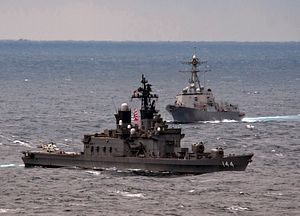Last Tuesday, Japanese government officials stated that the Ministry of Defense will request a record 5,255 billion yen ($48.1 billion) for fiscal year 2018. Government officials noted that the budget request, which represents a 2.5 percent increase from the initial defense budget for fiscal 2017, is in response to the series of recent North Korean ballistic missile launches and increased Chinese activities in the East and South China Seas.
Details of the request are yet to be fully finalized, but officials indicated that Japan will request money for: the introduction of the Aegis Ashore land-based missile defense system (amount unspecified because needs to be negotiated with the United States); SM-3 Block 2A intercept missiles (47.2 billion yen); PAC-3 MSE missiles (20.5 billion yen); the enhancement of the automatic warning and control system’s detection capacity (10.7 billion yen); the development of a next-generation radar capable of tracing stealth aircraft (19.6 billion yen); two destroyers that can remove sea mines (96.4 billion yen); six F-35A stealth fighters (88.1 billion yen); four Osprey tilt-rotor transport aircraft (45.7 billion yen) the maintenance of facilities for Self-Defense Forces units stationed on the southwestern islands of Okinawa (55.2 billion yen); the development of a high-speed glide bomb for use in contingencies on such islands (10 billion yen); the development of a system to monitor space activity (4.4 billion yen).
China, predictably, is unhappy with such developments. Hua Chunying, spokesperson for China’s Ministry of Foreign Affairs stated, “We are aware of the reports [about Japan’s defense spending request] and are concerned about this.” Hua continued that Japan has been exaggerating the “China threat” to increase military spending, and that China should be on high alert to Japan’s moves and its real motives.
It’s curious that China feels the need to figure out Japan’s “real motives” when Japan explicitly explains that it is concerned by China and North Korea. In its annual white paper released earlier this month, a reflection of Japan’s commitment to transparency (within reason), the Japanese Ministry of Defense stated that Japan is “deeply concerned” over North Korea’s progress in developing intercontinental ballistic missiles. The advances present a “new level of threat” by the hermit kingdom.
The paper also stepped up its alarm towards China, expressing “strong concerns” over China’s activities in the East and South China Seas, where China “continues to display what may be described as a heavy-handed attitude, including its attempts to alter the status quo by force.”
If approved, it will be the sixth straight annual increase under Prime Minister Shinzo Abe. However, it could still be pared back by the Ministry of Finance, which has to also take into account increased spending for social welfare as Japan’s population ages.
Furthermore, Japan is constrained by a five-year government defense plan, which runs until the end of fiscal 2018, that stipulates that annual defense budget increases, after subtracting the cost to maintain U.S. military bases, should be limited to 0.8 percent.

































